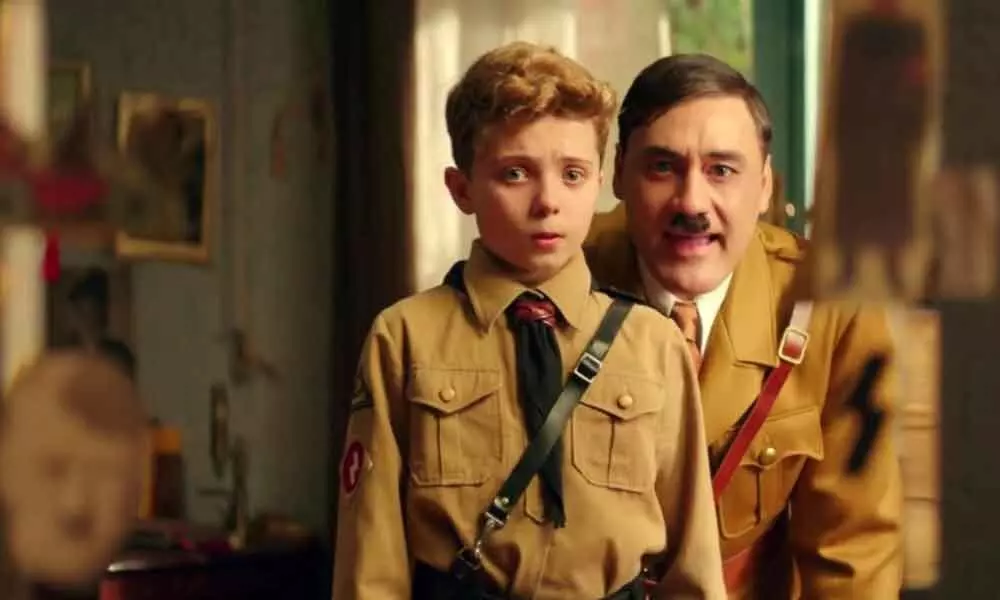Innocuously amusing, yet strangely unmoving

Set in the last days of World War II Germany, the film follows a 10-year-old boy named Johannes Betzler (Roman Griffin Davis), an enthusiastic and dedicated Nazi fan who lives with his mother Rosie (Scarlett Johansson) while his father is away at war.
Set in the last days of World War II Germany, the film follows a 10-year-old boy named Johannes Betzler (Roman Griffin Davis), an enthusiastic and dedicated Nazi fan who lives with his mother Rosie (Scarlett Johansson) while his father is away at war. He has a very active imagination including an imaginary friend: Adolf Hitler (played by Waititi), and he follows the party ideology like any 10-year-old could unfortunately hope to. When he discovers his mother has been hiding a Jewish teenage girl named Elsa (Thomasin McKenzie) in their attic, he is initially taken aback. Thanks to this unwanted guest who becomes a stand-in for his late sister, Jojo has to grapple with his naive but bigoted worldview, thereby questioning the ideology, as well as his loyalty to Nazism.
Roman Griffin Davis, McKenzie, and Johansson are nearly flawless in their characters. Davis is charmingly impressive and guileless from the beginning. The mocking "Rabbit" nickname is bestowed upon him after he is unable to kill an innocent bunny in cold blood during a Nazi youth training programme, hinting at his lack of real qualifications for membership in a regime of monsters.
McKenzie as Elsa is strong-willed and capable, making up stories that gently lead Jojo away from the path of anti-Semitism even as her own hope fails, while Johansson's maternal warmth also provides cover for a steely courage and depth.
The biggest laugh-out moments, ironically enough, come from Waititi's Hitler, a whiny, childish narcissist and paranoiac who turns to bluster and rage at a moment's notice. Anachronistic in his language and demeanour, the Hitler of Jojo's mind is his best friend until Jojo begins to see Elsa as a human being and not a monster. Waititi's Fuhrer is still more like Charlie Chaplin's Adenoid Hynkel in "The Great Dictator" than, say, Bruno Ganz's brooding, self-pitying Hitler in "Downfall". Although played as a fool, Waititi delivers a character that is subtly malicious.
The irrational and ludicrous hatred at the center of the Nazi ideology gets a boost throughout the narrative, with Waititi mining comedic excellence from Rebel Wilson, Stephen Merchant and Alfie Allen as local members of the Party, who devise ever more desperate ways to either indoctrinate or intimidate Jojo and other village youngsters, as it becomes clear that the war is a failure for the Reich.
It should come as no surprise that the best work of this bunch comes from Sam Rockwell as Captain Klenzendorf, who runs the local Hitler youth camp, but gradually reveals himself to be haunted by his own secrets.
Despite being a spoof on World War II, there are traces of honesty in the telling. The aesthetic and tone of the setup is simple. While it maintains the naive, childlike mindset's playfulness with a typically clever script from Waititi, there are a few rug pulls that bring into stark relief the tumult and tragedy of the setting.
Overall, even with a fabulous cast and the director's knack at verbal humour and sight gags, the film as a whole, oddly seems to be innocuously amusing. Its message is both relevant and simple, yet dismissible, and thus it is both enjoyable to watch and yet strangely unmoving. Also, the tone of the film has undercurrents of American fare.














